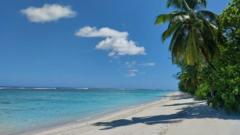In a small village on Agalega, an island in the Indian Ocean, local handyman Billy Henri has become a voice for his community as they grapple with the implications of recent military developments. Once a serene habitat for 350 residents primarily engaged in fishing and agriculture, Agalega has been transformed following a 2015 agreement allowing India to enhance its military presence there. This year, Henri packed his bags, disillusioned by what he perceives as the militarization of his cherished island.
The plans to expand Agalega are part of a broader maritime security collaboration between Mauritius and India, which included constructing a 3,000-meter runway and a new jetty. However, the local population fears that these developments will usher in a more robust military installation. Evidence of change is stark: satellite images reveal a landscape altered for military utility, with palm trees replaced by infrastructure.
Prominent features include a runway spanning the island and structures that may serve as hangars for the Indian navy's P-8I aircraft, designed for maritime surveillance. Furthermore, an emerging jetty raises eyebrows over its potential use by Indian naval vessels.
Despite the Indian government's assertions aimed at addressing piracy and unregulated fishing in the region, many residents express their apprehension. Residents like Henri cite a lack of transparency, compounded by restrictions on access to new facilities such as a hospital that locals are barred from using, prompting accusations that the Mauritian government is forcing conditions for their eventual departure.
Voices of dissent grow louder, paralleling concerns raised during the 1960s regarding the expulsion of communities from the Chagos Islands. Agalega inhabitants, some descendants of those who faced displacement, feel a historical echo in their current plight. President of the Association of Friends of Agalega, Laval Soopramanien, warns that his community may face a similar fate.
Adding to the tension, Prime Minister Pravind Jugnauth assured parliament that development projects were intended to uplift the local community. However, persistent healthcare failures and insufficient investment into Agalega lead many to question the government's sincerity. The unfulfilled need for better educational and economic opportunities prompts residents to speculate that the ultimate aim is to clear the islands of their native inhabitants to cater to foreign military interests.
As the Mauritian government works with India to build what they present as facilities for local benefit, resentment bubbles under the surface. Many locals remain unconvinced, given the absence of detailed plans and the existing limitations imposed upon their lives in their own homeland. The dual challenge of potential eviction and unfulfilled promises leave the people of Agalega at a crossroads, with their future hanging in the balance.



















